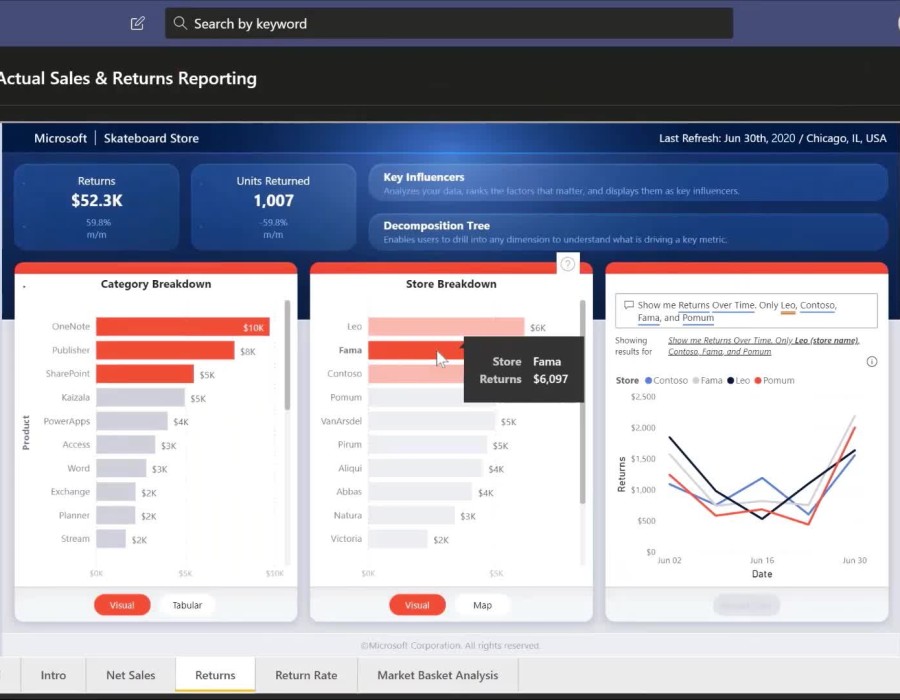Introduction: In an era where data is often referred to as the new oil, businesses are recognizing the need to harness the power of information for strategic decision-making. Microsoft, with its suite of business intelligence tools, has become a leader in this domain. A Microsoft Business Intelligence (BI) Consultant plays a pivotal role in guiding organizations through the intricate landscape of data analytics and visualization. This article delves into the responsibilities, skills, and impact of a Microsoft BI Consultant in today's dynamic business environment.
Understanding the Role of a Microsoft BI Consultant:
Defining Business Intelligence:
Business Intelligence involves the use of data analysis tools and techniques to convert raw data into actionable insights. Microsoft's BI stack, including Power BI, SQL Server, and Azure services, offers a comprehensive platform for business intelligence.
The Consultant's Mandate:
A Microsoft BI Consultant acts as a bridge between technology and business needs.
Their primary focus is to understand organizational goals, identify data-driven opportunities, and architect solutions that leverage Microsoft BI technologies.
Core Responsibilities of a Microsoft BI Consultant:
Requirements Gathering and Analysis:
Engaging with stakeholders to understand business objectives and information needs.
Conducting a thorough analysis of existing data sources and infrastructure.
Solution Architecture and Design:
Designing scalable and efficient BI solutions using Microsoft technologies.
Developing data models and ensuring proper integration between various components.
Implementation and Development:
Utilizing tools like SQL Server Integration Services (SSIS) for ETL (Extract, Transform, Load) processes.
Developing interactive dashboards, reports, and data visualizations using Power BI.
Data Warehousing:
Designing and implementing data warehouses to store and organize data for analytics.
Optimizing data structures for efficient querying and reporting.
Performance Tuning and Optimization:
Monitoring and optimizing the performance of BI solutions.
Identifying and resolving bottlenecks to ensure smooth data processing.
Skills and Expertise Required:
Technical Proficiency:
In-depth knowledge of Microsoft BI stack components, including Power BI, SQL Server, SSIS, SSAS (Analysis Services), and Azure services.
Proficiency in SQL query language for data manipulation and extraction.
Data Modeling and Visualization:
Expertise in designing effective data models to support analytics.
Strong skills in creating visually compelling and insightful reports and dashboards.
Communication and Collaboration:
Excellent communication skills to effectively interact with both technical and non-technical stakeholders.
Collaborative approach in working with cross-functional teams to align BI solutions with business goals.
Impact on Business:
Informed Decision-Making:
Empowering businesses with the ability to make data-driven decisions.
Providing stakeholders with real-time insights through interactive dashboards and reports.
Operational Efficiency:
Streamlining business processes through optimized data workflows.
Improving data accessibility and reducing the time required for information retrieval.
Strategic Planning:
Assisting in long-term strategic planning by identifying trends and patterns.
Enabling organizations to stay agile and responsive to market changes.
Conclusion: In the evolving landscape of business intelligence, a Microsoft BI Consultant serves as a linchpin in translating data into actionable intelligence. With the right blend of technical expertise, analytical skills, and a strategic mindset, these professionals contribute significantly to the success and competitiveness of organizations. As businesses continue to recognize the importance of data-driven decision-making, the role of a Microsoft BI Consultant becomes increasingly indispensable in shaping the future of intelligent enterprises.
For further info, visit our site: -
Power Bi Consultant Gold Coast
Business Intelligence Consulting Services





Comments